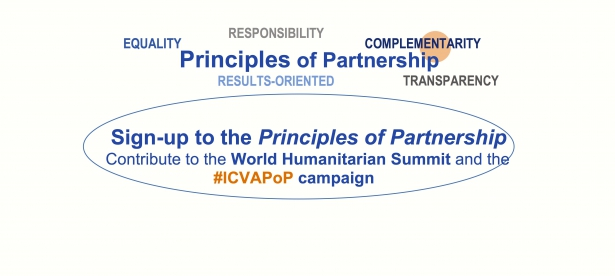-
Search -
Accessibility -
Members Login





Our work
ICVA leverages its collaborative advantage rooted in our long history and established role to create agile and effective partnerships with diverse stakeholders.
One of the greatest challenges of increasingly complex action is the capacity of diverse actors to truly collaborate, giving up control in favour of collective influence and in a way which is primarily shaped by those experiencing or closest to humanitarian needs. ICVA recognises the value and complementarity of other networks, international organizations, other actors in the civil, government and private sectors and that our collective impact can be multiplied by working together.
Creating partnerships is a necessity to be transformative in the way we collectively find innovative responses and durable solutions to humanitarian challenges. Solutions are often primarily social rather than technological and so legitimacy and connectedness to people in crisis is key to driving change.
The major social problems of our time, from poverty to climate change to political violence, all depend for their resolution on partnership among many stakeholders. Addressing the threats of shrinking civic space also demands a collective, collaborative strategy if trends are to be reversed. The 2007 Global Humanitarian Platform Principles of Partnership remain valid today and as ICVA network we take seriously our responsibility to do all we can to step up our game, leveraging our collaborative advantage to address the sociological root causes and consequences of humanitarian crises.
We give particular attention in ways of working or partnering with emergent initiatives, particularly refugee-led, women-led and youth-led organizations.

Throughout 2023 and 2024, ICVA, with the support of the Bureau for Humanitarian Assistance (BHA), organised four regional workshops. The workshops brought together International NGOs (INGOs) and Local and National NGOs (L/NNGOs) as well as invited donors and UN actors, to both review the Principles of Partnership and reflect on good practices, challenges, and potential solutions in their implementation. This report summarises the key findings and recommendations from the four workshops.
Click on the link below to read the Report.

The Principles of Partnership was an attempt to acknowledge some gaps within the humanitarian reform process, which included neglecting the role local and national capacity plays.

Principles of Partnership – Endorsed by the The Global Humanitarian Platform in July 2007.

The Principles of Partnership (Equality, Transparency, Results-Oriented Approach, Responsibility and Complementarity), were first published in 2007 as part of the Global Humanitarian Platform.
The PoP should serve as a reminder of the ongoing need to ensure that partnership arrangements with all humanitarian actors are rooted in equality. Further, that the implementation of humanitarian activities seeks to involve, respect and react to valuable input from all partners and crisis-affected communities.

ICVA is a global network of non-governmental organisations whose mission is to make humanitarian action more principled and effective by working collectively and independently to influence policy and practice.
International Council of Voluntary Agencies
NGO Humanitarian Hub,
La Voie-Creuse 16, 1202, Geneva, Switzerland
Email: secretariat@icvanetwork.org
A curation of monthly updates, latest news, tools, and events around forced migration, coordination, financing, and cross cutting issues all sent straight to your inbox.